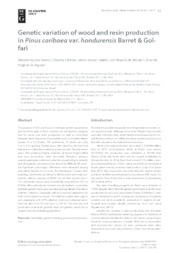Genetic variation of wood and resin production in Pinus caribaea var. hondurensis Barret & Golfari.
Genetic variation of wood and resin production in Pinus caribaea var. hondurensis Barret & Golfari.
Autoria: SANTOS, W. dos; SOUZA, D. C. L.; MORAES, M. L. T. de; AGUIAR, A. V. de
Resumo: The purpose of this work was to estimate genetic parameters and selection gain of Pinus caribaea var. hondurensis progeny trial for wood and resin production as well as correlation between them. Experiment was established in complete lattice square 10 x 10 (triple), 100 treatments, 10 plants per plot, 3 m x 3 m spacing. Twelve years after planting the trial had thinned considerably leaving six plants per plot. Twenty-seven years after planting height, diameter at breast height (dbh) and resin production were measured. Deviance analysis, genetic parameter estimates, selection expected gain, genetic and phenotypic correlation were based on REML/BLUP method. Significant phenotypic differences were observed among and within families for all traits. The thinning at 12 years after planting, contributed positively to dbh increase and resin production, with an average of 30.60 cm and 4.83 kg tree-1year-1. The individual narrow sense heritability ranged from 0.25 to 0.38 for dbh and volume. Genetic and phenotypic correlation between growth traits were positive, and significant. Therefore, different selection strategies will be proposed separately for both traits (resin and wood). The selection gains were significant, especially with 10 % selection intensity (individual selection) for dbh (7.53 %) and resin (13.49 %). The trial has had good performance for growth, resin and genetic variability to support the next breeding generation.
Ano de publicação: 2016
Tipo de publicação: Artigo de periódico
Unidade: Embrapa Florestas
Palavras-chave: Genetic breeding, Heritability, Madeira, Parâmetro genético, Pinus, Produção de sementes, Resina, Resins, Seed crop production, Wood
Observações
1 - Por padrão são exibidas publicações dos últimos 20 anos. Para encontrar publicações mais antigas, configure o filtro ano de publicação, colocando o ano a partir do qual você deseja encontrar publicações. O filtro está na coluna da esquerda na busca acima.
2 - Para ler algumas publicações da Embrapa (apenas as que estão em formato ePub), é necessário ter, no celular ou computador, um desses softwares gratuitos. Sistemas Android: Google Play Livros; IOS: iBooks; Windows e Linux: software Calibre.
Acesse outras publicações
Acesse a Base de Dados da Pesquisa Agropecuária (BDPA) para consultar o acervo completo das bibliotecas da Embrapa.

